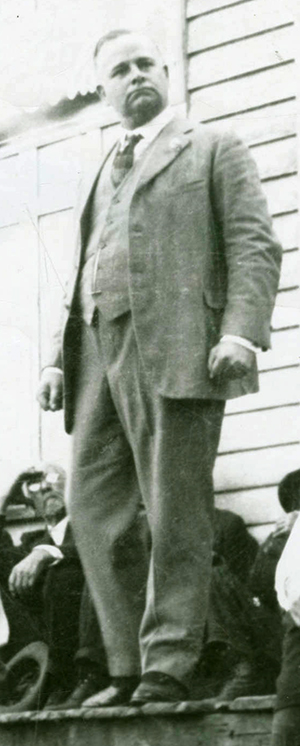27 July 1876–12 Nov. 1947

Thomas Contee Bowie, frequent member of the General Assembly of North Carolina, was a vocal representative of the mountain counties, an occasional state-wide political aspirant, and a caustic conservative critic. A descendant of prominent families, "Tam" Bowie was born in Lake St. Joseph, Tensas Parish, La., to John Ruth and Carrie Calloway Bowie. His father was a wealthy planter and his mother a descendant of James Calloway, a physician and member of the North Carolina assembly. Bowie became an orphan at age six; he moved to North Carolina, where he attended schools in Moravian Falls and Traphill and Mars Hill Academy. Interspersed with the schooling were forays to West Virginia—the first when he was only twelve years old—where he worked in coal mines. In 1895 he entered The University of North Carolina, completing a Ph.B. degree in 1899. As an undergraduate he won several distinctions for the oratorical ability he carried with him into his law practice and public career: the declaimers' medal, the debaters' medal, and the Willie P. Mangum medal. From Chapel Hill he went to Yale University to study political science but returned to The University of North Carolina to study law; he was admitted to the state bar in 1901.
Bowie immediately entered politics as the 1902 Democratic nominee for the North Carolina Senate from the strongly Republican district around Ashe County. He lost that race by only seventy votes. In 1908 he successfully campaigned for the state house of representatives but then declined to run for reelection. In 1913 he returned to the General Assembly and in 1915 was unanimously elected speaker of the house. Defeated from his district in 1916, he returned to the General Assembly in 1921, 1923, and 1925. After a break he reappeared in Raleigh in 1933 and 1935.
In the assembly he was a strong advocate of the interests of the mountain counties and came to be called by some reporters "the Lion of the Mountains." He successfully promoted two important pieces of legislation: a 1921 act to initiate a $50 million road building program in North Carolina and a 1923 act to enable the state to build a $10 million railroad to connect the mountain counties with Wilmington and the coastal regions. The implementation of the highway act effectively negated the importance of the railroad act, and the line was never built.
In 1927, Governor Angus W. McLean appointed Bowie one of two emergency judges on the superior court. This was his only state-wide office, although he tried twice unsuccessfully to bid for state-wide elective office. In 1924 he sought to be elected lieutenant governor and in 1932 he ran against Bob Reynolds for the Democratic nomination for U.S. Senate. As a senatorial aspirant, he campaigned for downward revision of the tariff, reevaluation of land values to lower the tax on farmers, and a program of economy on all levels of government. Those goals explain some of his conservative opposition to much welfare legislation and to the North Carolina Emergency Relief Administration in the 1930s, while he was again serving in the general assembly.
Following his 1935 service in the assembly, Bowie tried at least once again to obtain a seat in the house of representatives from Ashe County. In 1940, explaining that he was upset by the increases in local taxes, he sought to gain the Democratic nomination from W. D. Austin, who had been chairman of the Ashe County Democratic party from 1919 to 1925. Austin defeated him by a vote of 162 to 63 in the county convention and won the seat.
The county elected a Republican representative to Raleigh in 1943 and 1945. Bowie meanwhile, had retired to the practice of law, to the supervision of his considerable landholdings in the county, and to oversight of his cattle breeding experiments. He was also president of the First National Bank of West Jefferson, which he had helped to found. He maintained his law offices in the town and had a reputation as a colorful trial attorney.
Bowie married the former Jean Davis of Charlotte in 1906. They had three children: Thomas Contee, Jr., who later joined his father's law practice; Elizabeth, who married Carter Redd of Birmingham, Ala.; and Jean, who died in infancy.
Bowie died in North Wilkesboro and the body was returned to his home in West Jefferson for burial in a prominent mausoleum in what is now the West Jefferson Cemetery. There the body rests, along with those of his wife, his daughter, Jean, his son, who died in 1969, and his cocker spaniel, Chubby, who was his constant companion.